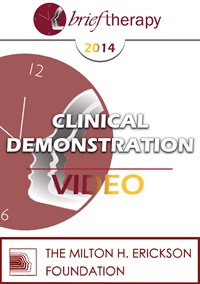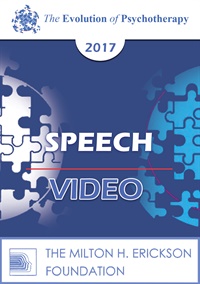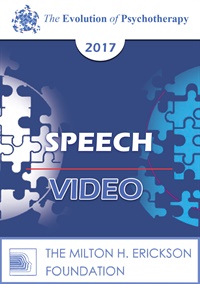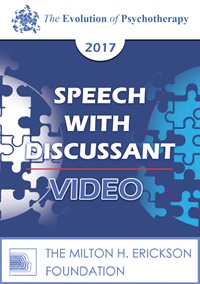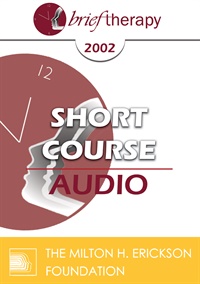
- Average Rating:
- Not yet rated
- Topic Areas:
- Short Courses | Abuse | Storytelling | Brief Therapy | Memory
- Categories:
- Brief Therapy Conference | Brief Therapy Conference 2002
- Faculty:
- Janice Gasker, DSW
- Duration:
- 1:19:27
- Format:
- Audio Only
- Original Program Date:
- Dec 12, 2002
- Short Description:
- Explore the empirical analysis of the life stories of Marilyn Monroe, Carl Jung, Virginia Woolf, DH Lawrence, Oprah Winfrey and others to identify components of healthy life narratives about sexual abuse. Hear intriguing life stories while learning new narrative techniques for helping adult victims of childhood sexual ·abuse to integrate traumatic memories into functional life stories.
- Price:
- $15.00 - Base Price
Tags: Abuse Storytelling Brief Therapy Memory
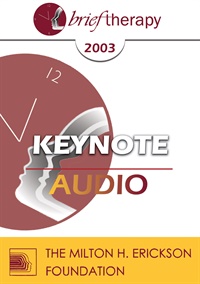
- Average Rating:
- Not yet rated
- Topic Areas:
- Keynotes | Psychotherapy | Trauma | Memory | Post-Traumatic Stress Disorder (PTSD) | Storytelling | Constructive Narrative
- Categories:
- Brief Therapy Conference | Brief Therapy Conference 2003
- Faculty:
- Donald Meichenbaum, PhD
- Duration:
- 54:14
- Format:
- Audio Only
- Original Program Date:
- Dec 11, 2003
- Short Description:
- The assessment and treatment implications of patient victimization will be critically examined from a constructive narrative perspective. A phase-oriented cognitivebehavioral treatment model will be presented for adults with PTSD, Complex PTSD, and related co-morbid disorders. A critical analysis will be offered of various forms of so-called "memory work" interventions.
- Price:
- $15.00 - Base Price
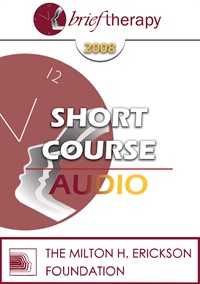
- Average Rating:
- Not yet rated
- Topic Areas:
- Short Courses | Memory | Psychotherapy | Utilization | Brief Therapy
- Categories:
- Brief Therapy Conference | Brief Therapy Conference 2008
- Faculty:
- Joseph Meyerson, MA
- Duration:
- 47:01
- Format:
- Audio Only
- Original Program Date:
- Dec 11, 2008
- Short Description:
- The possibility of utilizing memory plasticity for therapeutic purposes has not been widely recognized, although a number of theoretical and clinical venues during the past century have shown its potential application. This short course is aimed at shedding light on this broad field of hypnotherapeutic interventions and to present a primary map for the clinician interested in the psychotherapeutic implementation of MFI.
- Price:
- $15.00 - Base Price
- Average Rating:
- Not yet rated
- Topic Areas:
- Clinical Demonstrations | Memory | Trauma | Brief Therapy
- Categories:
- Brief Therapy Conference | Brief Therapy Conference 2014
- Faculty:
- Bessel van der Kolk, MD
- Course Levels:
- Master Degree or Higher in Health-Related Field
- Duration:
- 1:01:37
- Format:
- Audio and Video
- Original Program Date:
- Dec 13, 2014
- Short Description:
- Stories have the ability to engage people emotionally and to move them to change, but telling the right story at the right time to the right person is an art and a skill. This demonstration will show a gentle, artful and respectful way of doing brief therapy that uses stories to invite change.
- Price:
-
Sale is $29.00
price reduced from Base Price - $59.00
Tags: Brief Therapy Memory Trauma
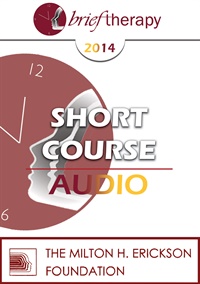
- Average Rating:
- Not yet rated
- Topic Areas:
- Trauma | Short Courses | Memory | Ericksonian Hypnosis and Therapy Techniques | Psychology
- Categories:
- Brief Therapy Conference | Brief Therapy Conference 2014
- Faculty:
- Dan Short, PhD
- Duration:
- 1:32:01
- Format:
- Audio Only
- Original Program Date:
- Dec 11, 2014
- Short Description:
- Ericksonian trauma work utilizes the experience of the present to redefine the past, while remaining future oriented. Memory reconsolidation occurs as memories are physically altered and re-encoded with new emotional elements. More than symptom relief, the intentional use of imagination and creative problem solving ensures greater resiliency for future challenges.
- Price:
- $15.00 - Base Price
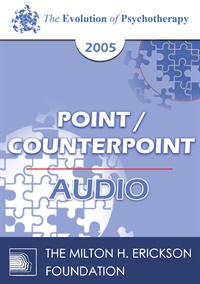
- Average Rating:
- Not yet rated
- Topic Areas:
- Point/Counterpoint Sessions | Abuse | Memory | Psychotherapy | Trauma
- Categories:
- Evolution of Psychotherapy | Evolution of Psychotherapy 2005
- Faculty:
- Francine Shapiro, PhD | Otto Kernberg, MD
- Duration:
- 1 Hour 13 Minutes
- Format:
- Audio Only
- Original Program Date:
- Dec 08, 2005
- Short Description:
- EP05 Point/Counterpoint 09 - Ending the Cycle of Violence - Francine Shapiro, Ph.D. The Adaptive Information Processing model, which guides EMDR, posits that dysfunctional beliefs, emotions and behaviors are often a direct manifestation of etiological events that have been improperly stored in memory. Implications of the model underscore the obligation of our profession to treat both victims and perpetrators of abuse and violence worldwide.
- Price:
- $15.00 - Base Price
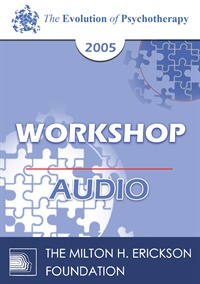
EP05 Workshop 23 - The Creative Reconstruction of Mind, Memory and Consciousness - Ernest Rossi, PhD
- Average Rating:
- Not yet rated
- Topic Areas:
- Workshops | Consciousness | Memory | Four-Stage Creative Process | Genomics | Hypnosis | Neuroscience | Psychotherapy
- Categories:
- Evolution of Psychotherapy | Evolution of Psychotherapy 2005
- Faculty:
- Ernest Rossi, PhD
- Duration:
- 2 Hours 36 Minutes
- Format:
- Audio Only
- Original Program Date:
- Dec 08, 2005
- Short Description:
- Lecture, group and individual demonstrations with volunteers from the audience will illustrate Rossi's activity-dependent approaches to therapeutic hypnosis and psychotherapy that are consistent with the theory and research on the molecular-genomic level plasticity for the creative reconstruction of mind, memory and consciousness.
- Price:
- $15.00 - Base Price
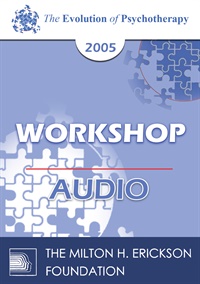
- Average Rating:
- Not yet rated
- Topic Areas:
- Workshops | Trauma | Eye Movement Desensitization and Reprocessing (EMDR) | Hypnosis | Memory | Neurobiology | Neuroscience | Psychotherapy
- Categories:
- Evolution of Psychotherapy | Evolution of Psychotherapy 2005
- Faculty:
- Bessel van der Kolk, MD
- Duration:
- 2 Hours 7 Minutes
- Format:
- Audio Only
- Original Program Date:
- Dec 10, 2005
- Short Description:
- Starting with a review of recent studies on the neurobiology of trauma, Dr. van der Kolk will examine the utility of approaches from the fields of hypnosis, body oriented therapies and EMDR, both with research data and videotaped clinical interventions. The integration of these approaches during different stages of treatment will be discussed.
- Price:
- $15.00 - Base Price
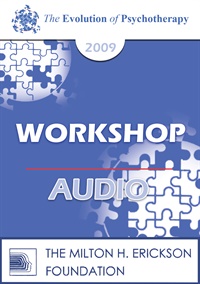
- Average Rating:
- Not yet rated
- Topic Areas:
- Eye Movement Desensitization and Reprocessing (EMDR) | Workshops | Memory | Psychotherapy
- Categories:
- Evolution of Psychotherapy | Evolution of Psychotherapy 2009
- Faculty:
- Francine Shapiro, PhD
- Duration:
- 1 Hour 56 Minutes
- Format:
- Audio Only
- Original Program Date:
- Dec 13, 2009
- Short Description:
- EMDR directly addresses the physiologically stored memory networks that underlie both psychological problems and mental health. This orientation to both case conceptualization and treatment will be explored to address diverse clinical applications, including attachment issues, body image, chronic pain, substance abuse, sexual dysfunction, personality disorders, and other presenting complaints. The Integration of EMDR with family therapy practices will also be discussed.
- Price:
- $15.00 - Base Price
- Average Rating:
- Not yet rated
- Topic Areas:
- Trauma | Invited Addresses | Memory | Post-Traumatic Stress Disorder (PTSD) | Psychotherapy | Research
- Categories:
- Evolution of Psychotherapy | Evolution of Psychotherapy 2013
- Faculty:
- Bessel van der Kolk, MD
- Course Levels:
- Master Degree or Higher in Health-Related Field
- Duration:
- 52:44
- Format:
- Audio and Video
- Original Program Date:
- Dec 13, 2013
- Short Description:
- This workshop explores how trauma affects people’s rhythms within themselves and with their surroundings. Trauma changes the way the brain processes information and how the human organism engages with the world. Because of biological systems that are altered in a use-dependent manner traumatized people continue to react in myriad ways to current experience as a replay of the past.
- Price:
-
Sale is $29.00
price reduced from Base Price - $59.00
Credit available - Click Here for more information
- Average Rating:
- Not yet rated
- Topic Areas:
- Speeches | Meditation, Spirituality and Yoga | Memory | Psychotherapy | Consciousness
- Categories:
- Evolution of Psychotherapy | Evolution of Psychotherapy 2017 | Online Continuing Education
- Faculty:
- Jean Houston, PhD
- Course Levels:
- Master Degree or Higher in Health-Related Field
- Duration:
- 1:00:39
- Format:
- Audio and Video
- Original Program Date:
- Dec 15, 2017
- Short Description:
- The discovery of the quantum nature of our universe is so major an event that its profound implications cannot be overstated. Quantum theory demands a radical re-visioning of the role of Consciousness as the underlying organizing principle of the universe. Working with these concepts, both spiritual and scientific, we have enabled students to be, to do and to create in ways that are suggestive of higher levels of human accomplishment. Similarly from the quantum perspective of the simultaneity of past, present and future we are able to change the story of minor past events until it become a realistic part of one’s memory.
- Price:
-
Sale is $29.00
price reduced from Base Price - $59.00
Credit available - Click Here for more information
- Average Rating:
- Not yet rated
- Topic Areas:
- Speeches | Memory | Continuing Education | Psychology | Psychotherapy
- Categories:
- Evolution of Psychotherapy | Evolution of Psychotherapy 2017 | Online Continuing Education
- Faculty:
- Elizabeth Loftus, PhD
- Course Levels:
- Master Degree or Higher in Health-Related Field
- Duration:
- 56:41
- Format:
- Audio and Video
- Original Program Date:
- Dec 16, 2017
- Short Description:
- For several decades, I have been manufacturing memories in unsuspecting minds. People can be led to believe that they did things that would have been rather implausible. They can be led to falsely believe that they had experiences that would have been emotional or traumatic had they actually happened. False memories, like true ones, also have consequences for people, affecting later thoughts, intentions, and behaviors. Can we tell true memories from false ones? In several studies, I created false memories in the minds of people, and then compared them to true memories. Once planted, the false memories look very much like true memories—in terms of behavioral characteristics, emotionality and neural signatures. If false memories can be so readily planted in the mind, do we need to think about “regulating” this mind technology? And what do these pseudo memories say about the nature of memory itself?
- Price:
-
Sale is $29.00
price reduced from Base Price - $59.00
Credit available - Click Here for more information
- Average Rating:
- Not yet rated
- Topic Areas:
- Speeches with Discussants | Trauma | Somatic Experiences | Memory | Continuing Education | Psychotherapy
- Bundle(s):
- Learning Track - EP17 Trauma Stream
- Categories:
- Evolution of Psychotherapy | Evolution of Psychotherapy 2017 | Evolution of Psychotherapy Trauma Learning Track | Online Continuing Education
- Faculty:
- Peter Levine, PhD | Bessel van der Kolk, MD
- Course Levels:
- Master Degree or Higher in Health-Related Field
- Duration:
- 1:23:22
- Format:
- Audio and Video
- Original Program Date:
- Dec 16, 2017
- Short Description:
- There is tremendous confusion in work with traumatic memories, often leaving clients and their therapists confused and insecure. In this lecture we will discuss the different types of memory (both explicit/conscious & implicit/unconscious) in resolving traumatic reactions, while avoiding the creation of "false memories."
- Price:
-
Sale is $29.00
price reduced from Base Price - $59.00
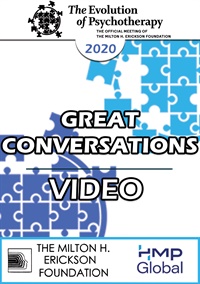
- Average Rating:
- Not yet rated
- Topic Areas:
- Psychology | Great Conversations | Memory
- Categories:
- Evolution of Psychotherapy | Evolution of Psychotherapy 2020
- Faculty:
- Elizabeth Loftus, PhD | Michael Yapko, PhD
- Course Levels:
- Master Degree or Higher in Health-Related Field
- Duration:
- 1 hour 31 minutes
- Format:
- Audio and Video
- Original Program Date:
- Dec 10, 2020
- Short Description:
- Two leading experts explore the science and controversy surrounding memory, suggestion, and therapy. They trace how false and repressed memory claims shaped legal and clinical practice, highlighting the dangers of therapist influence and the need for corroboration and critical thinking. The discussion examines hypnosis, trauma treatment, and belief systems, urging clinicians to balance empathy with scientific rigor and to recognize memory’s power—and its fallibility—in healing.
- Price:
-
Sale is $29.00
price reduced from Base Price - $59.00
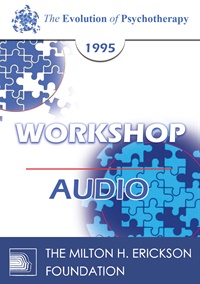
- Average Rating:
- Not yet rated
- Topic Areas:
- Workshops | Redecision Therapy | Memory | Psychotherapy
- Categories:
- Evolution of Psychotherapy | Evolution of Psychotherapy 1995
- Faculty:
- Mary Goulding, MSW
- Duration:
- 1 Hour 29 Minutes
- Format:
- Audio Only
- Original Program Date:
- Dec 13, 1995
- Short Description:
- Memories may be treated as one-act dramas, dialogues or dreams, as volunteers use them, incorporate them in new ways and let them return to the past. Demonstration, with audience volunteers, of a single childhood memory to make changes in their current lives will illustrate Redecision Therapy.
- Price:
- $15.00 - Base Price
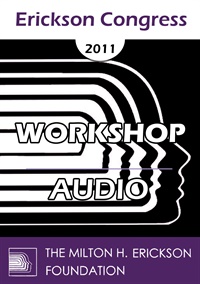
- Average Rating:
- Not yet rated
- Topic Areas:
- Trauma | Workshops | Memory | Buddhism | Psychotherapy | Post-Traumatic Stress Disorder (PTSD) | Trance
- Categories:
- Erickson Congress | Erickson Congress 2011
- Faculty:
- Ricardo Feix, MD
- Duration:
- 59 Minutes
- Format:
- Audio Only
- Original Program Date:
- Dec 07, 2011
- Short Description:
- Clinical case demonstrates an integrative approach of treating deep trauma. DTMR approximates east and west, old and new traditions. Utilizes concepts from occidental psychotherapy, transpersonal influ-ences and some about Kardecism, Buddhism and Xamanism. Through a deep trance, active, eclectic DTMR responds as a tool for patients with PTSD and dissociation.
- Price:
- $20.00 - Base Price
Tags: Buddhism Psychotherapy PTSD Trance Trauma


